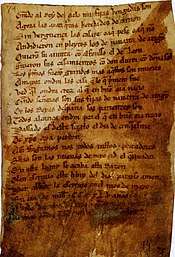Panamanian Spanish
Panamanian Spanish is the Spanish (Castilian) language as spoken in the country of Panama. It is closely related to other varieties of Caribbean Spanish.
| Panamanian Spanish | |
|---|---|
| Español panameño | |
| Native to | Panama |
Native speakers | 2.5 million (2014)[1] L2: 463,000 in Panama (2014) |
Indo-European
| |
| Latin (Spanish alphabet) | |
| Official status | |
Official language in | |
| Regulated by | Academia Panameña de la Lengua |
| Language codes | |
| ISO 639-1 | es |
| ISO 639-2 | spa[2] |
| ISO 639-3 | – |
| Glottolog | None |
| IETF | es-PA |
| Spanish language |
|---|
 Spanish around the 13th century |
| Overview |
| History |
|
| Grammar |
| Dialects |
| Dialectology |
| Interlanguages |
| Teaching |
The variations among different speaker groups of the same language can be lexical (vocabulary), phonological (pronunciation), morphological (word forms), or in the use of syntax (grammar).
Historically, Panama and Colombia were part of the same political entity. Colombia, governed from the Real Audiencia of Panama during the 16th century, then part of Castilla de Oro, with its capital in Panama, during the 17th century, and after independence from Spain, Panama voluntarily became part of the Republic of Gran Colombia along with Venezuela and Ecuador, with its capital in Bogota. From the colonial times and periods and also during most of the 19th century and until 1903, and even though there are still lexical similarities shared by the two countries (e.g., pelao in both Colombia and Panama means "kid" or "child"), phonetically, Panamanian Spanish is very similar with the Spanish as spoken in the coastal areas around the Caribbean, specifically Cuba, Puerto Rico, the Dominican Republic and the Atlantic coast of Colombia and Venezuela.
Phonology
The main characteristic of Caribbean Spanish is the debuccalization of the /s/ sound at the end of a syllable or word, such as in the word cascada, pronounced [kahˈkaða] (like "h" in the English word "he") instead of [kasˈkaða]. The aspiration is also observed in the coastal regions of Peru and Ecuador; in Chile, Argentina, and Uruguay; and in Andalusia and the Canary Islands of Spain.
Another change observed in Panamanian Spanish is the deaffrication of /tʃ/ (as "ch" in the English word "chips") to [ʃ] (as "sh" in the English word "she"), so muchacho is pronounced [muˈʃaʃo], rather than [muˈtʃatʃo]. It is found primarily among less-educated speakers, but it can sometimes be observed among better-educated speakers, as in Andalusian Spanish.
The /x/ is realized as glottal [h], as in Caribbean and other Latin American Spanish dialects, Canarian, and Andalusian Spanish dialects.
Vocabulary
Lexically, Panamanian Spanish presents a variety of new terms introduced and being incorporated into the daily language all the time. The following quotation shows some common Panamanian expressions:
"Vecina, yo no soy vidajena, y no me gusta esa vaina ... pero te voy a contar un bochinche...
pero si me das de comer un poco de chicheme, concolón, carimañola, sancocho y mondongo....
Ese man flacuchento y ñato vestido de guayabera azul y sombrero montuno que viene allí ... Su motete ya no tiene ñame, guineo ni guandú. Lo que tiene es un pocotón de chécheres. Según la comadre fula radiobemba, el cambio en ese laopé no se debe a una macuá ..." ¹
¹ From Carlos "Cubena" Guillermo Wilson, "El aporte cultural de la etnia negra en Panamá"
[Note: laopé = pelao ("boy") (vesre)]
Panamanians sometimes use loanwords from English, partly due to the prolonged existence of the Panama Canal Zone. Examples are breaker (from circuit breaker) instead of the Spanish interruptor, switch (from light switch) instead of the Spanish interruptor, fren (from friend) instead of Spanish amigo or amiga (this term is used in a unisex way), ok (from okay) instead of the Spanish vale, and so on. Many of these quotes and phrases are based in the Macaronic language presented in Panamanian slang.
Further reading
- http://www.personal.psu.edu/jml34/lumbalu.pdf - --John M. Lipski (1997): "El Lenguaje de los negros congos de Panamá"—Alba, Orlando (1992): "El español del Caribe: unidad frente a diversidad dialectal" Revista de Filología Espaňola,72, 525–540.
- Alvarado de Ricord, Elsie: El español de Panamá; estudio fonético y fonológico. Panama, 1971.
- Banse, Timoteo, Panamanian Spanish Slang: Words and Phrases ISBN 978-0934523-03-5.
- Giralt Latorre, Javier (1991): "Algunos préstamos en el español de Panamá". Estudios de Lingüística de la Universidad de Alicante, 7, 137–158.
- Broce, Marlene y Torres Cacoullos, Rena (2002): "'Dialectología urbana' rural: la estratificación social de (r) y (l) en Coclé, Panamá". Hispania, 85/2, 342–354.
- Quilis, Antonio y Graell Stanziola, M. (1992): "La lengua española en Panamá". Revista de Filología Española, 72/3–4, 583–638.
- Cedergren, Henrietta J. (1978): "En torno a la variación de la /S/ final de sílaba en Panamá: análisis cuantitativo", en López Morales, Humberto (ed.), Corrientes actuales en la dialectología del Caribe hispánico, Río Piedras, Universidad de Puerto Rico, 80–103.
- Cedergren, Henrietta J.; Rousseau, Pascale y Sankoff, David (1986): "La variabilidad de /r/ implosiva en el español de Panamá y los modelos de ordenación de reglas", en Núñez Cedeño, R., I. Páez Urdaneta y L. Guitart (eds.), Estudios sobre la fonología del español del Caribe, Caracas, Ediciones La Casa de Bello, 13–20.
- Graell Stanziola, M. y Quilis, Antonio (1991): "Datos sobre la lengua española en Panamá", en Hernández Alonso, C. y otros (eds.), Actas del III Congreso Internacional de 'El Español de América', 2, Valladolid, Junta de Castilla y León, 997–1005.
- Malmberg, B. 1965. Estructura silábica del español. Estudios de Fonética Hispánica, Madrid: C.S.I.C.
- Quesada Pacheco, Miguel A. 1996. El español de América Central. En Manual de dialectología hispánica. El español de América, ed. Manuel Alvar. 101–115. Barcelona: Ariel.
References
- Spanish → Panama at Ethnologue (18th ed., 2015)
- "ISO 639-2 Language Code search". Library of Congress. Retrieved 22 June 2019.